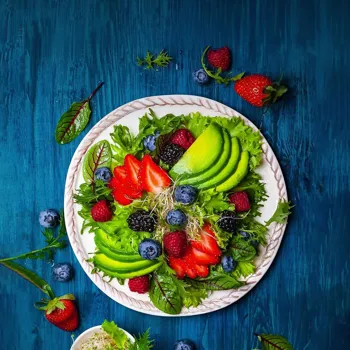Unveiling the Secrets of Mindful Eating for a Healthier Relationship with Food. Dive into the journey of self-discovery!
In a country like India, food is more than just sustenance; it's tradition, celebration,
and a cornerstone of our social lives. From elaborate family feasts to quick street food bites, food is woven into the fabric of our daily existence.
But with this deep connection, it's easy to develop a complicated relationship with what we eat. Are you constantly dieting? Feeling guilty after enjoying your favourite sweets? Or maybe you find yourself turning to food for comfort when stress hits? If so, this article is for you.
We'll explore practical ways to cultivate a healthier and happier relationship with food, focusing on mindful eating, intuitive choices, and ditching those restrictive diet rules. Get ready to nourish your body and mind!
Understand your body's hunger cues for healthier eating habits
One of the key steps towards a healthier relationship with food is understanding your body's hunger and fullness cues. Many of us have lost touch with these natural signals, often eating out of habit, boredom, or emotional triggers rather than genuine hunger.

Start by paying attention to how your body feels before, during, and after meals. Ask yourself: Am I truly hungry, or am I eating because it's lunchtime? Notice the subtle signs of hunger – a slight growl in your stomach, a dip in energy levels, or difficulty concentrating.
Similarly, pay attention to when you start feeling comfortably full, not stuffed. It takes practice, but learning to listen to your body will help you eat only when you need to and stop when you've had enough.
Avoid distractions like TV or your phone while eating, as these can prevent you from truly savouring your food and recognizing fullness. Slow down, chew your food thoroughly, and enjoy each bite.
This mindful approach can transform your eating experience and help you appreciate the nourishment your food provides. This also involves rejecting the guilt associated with enjoying food, especially during festivals where rich and delicious dishes are common.
Practice mindful eating for a conscious and compassionate food relationship
The concept of mindful eating goes beyond just paying attention to hunger cues; it's about cultivating a present moment awareness of the entire eating experience. This means engaging all your senses – noticing the colours, textures, aromas, and flavours of your food.
Before you take a bite, take a moment to appreciate the meal in front of you. Where did the ingredients come from? Who prepared it? How does it make you feel? As you eat, savour each bite, paying attention to the different tastes and sensations.
Put down your fork between bites to slow yourself down and give your body time to register fullness. Avoid judgment and criticism; simply observe your thoughts and feelings without getting caught up in them.
If you find yourself feeling guilty or anxious about eating certain foods, acknowledge those feelings and remind yourself that all foods can fit into a balanced diet. Mindful eating is not about perfection; it's about cultivating a more conscious and compassionate relationship with food.
It's about recognizing that food is not the enemy, but rather a source of nourishment, pleasure, and connection.
Embrace intuitive eating for a healthy relationship with food
Another crucial aspect of a healthy relationship with food is letting go of restrictive diets and embracing intuitive eating. Diets often focus on what you can't eat, creating feelings of deprivation and leading to cravings and overeating.
Instead of following rigid rules, focus on making choices that nourish your body and mind. Ditch the calorie counting, food tracking apps, and restrictive meal plans. Instead, trust your body's wisdom and allow yourself to eat what you truly crave.
This doesn't mean eating junk food all day long; it means giving yourself permission to enjoy all foods in moderation, without guilt or shame. Intuitive eating is about tuning into your body's needs and honoring your hunger and fullness cues.
It's about recognizing that your food choices are influenced by a variety of factors, including your physical needs, emotional state, and social context. By practicing intuitive eating, you can break free from the diet cycle and develop a more sustainable and enjoyable relationship with food.
Remember, there are no "good" or "bad" foods, only choices that suit your individual needs and preferences.
Emotional eating impact and coping strategies for healthier habits
Emotional eating is a common challenge that can significantly impact our relationship with food. Many of us turn to food for comfort, stress relief, or to cope with difficult emotions.

While it's normal to occasionally indulge in comfort foods, relying on food as a primary coping mechanism can lead to unhealthy eating patterns and feelings of guilt and shame. The first step in addressing emotional eating is to identify your triggers.
What situations, emotions, or thoughts lead you to crave food when you're not physically hungry? Keep a food journal to track your eating habits and note any emotional factors that may be contributing to your cravings.
Once you've identified your triggers, you can begin to develop alternative coping strategies. Instead of reaching for food when you're feeling stressed, try taking a walk, practicing yoga, listening to music, or talking to a friend.
Find activities that help you relax and manage your emotions in a healthy way. It's also important to be kind to yourself and avoid judging yourself for emotional eating. Everyone struggles with this from time to time.
If you find it difficult to manage emotional eating on your own, consider seeking support from a therapist or registered dietitian.
Surround yourself with supportive community for healthy relationship with food
Surrounding yourself with a supportive community can make a world of difference in your journey towards a healthier relationship with food. Talk to your family and friends about your struggles and successes, and seek out others who share your goals.
Find online communities or support groups where you can connect with like-minded individuals and share tips and encouragement. A supportive community can provide you with accountability, motivation, and a sense of belonging.
They can also offer valuable insights and perspectives that can help you overcome challenges and stay on track with your goals. Avoid comparing yourself to others and focus on your own progress. Remember that everyone's journey is unique, and there will be ups and downs along the way.
Celebrate your achievements, no matter how small, and be kind to yourself during setbacks. A supportive community can help you stay positive and motivated, even when things get tough. Sharing vegetarian recipes can also provide a source of ideas for a wholesome meal.
Building a healthy relationship with food is a journey, not a destination
Finally, remember that building a healthy relationship with food is a journey, not a destination. There will be good days and bad days, moments of progress and moments of setbacks. Be patient with yourself, and don't expect perfection.

Focus on making small, sustainable changes that you can maintain over the long term. Celebrate your successes, no matter how small, and learn from your mistakes. Remember that food is not the enemy; it's a source of nourishment, pleasure, and connection.
By cultivating a more mindful, intuitive, and compassionate relationship with food, you can nourish your body and mind and live a healthier, happier life. And most importantly, remember to enjoy your food! Savour each bite, appreciate the flavours, and celebrate the joy of eating.
Food is meant to be enjoyed, not feared. Let go of the guilt and shame, and embrace the pleasure of nourishing your body with delicious and wholesome meals.
AI Generated Content. Glance/InMobi shall have no liability for the content












